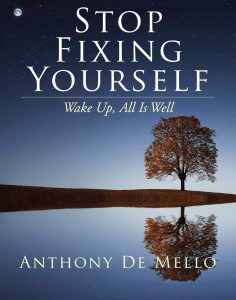 Summary: A book that is hard to recommend, because it needs a lot of caveating. The right person will find it helpful, most will not.
Summary: A book that is hard to recommend, because it needs a lot of caveating. The right person will find it helpful, most will not.
I have a ambivalent attitude toward reading the mystics. I value mystical thinking and practice, but I tend to find reading them an exercise in frustration. Mystics are often vague and contradictory. They often use language in unusual ways. But there is often still real help there.
Part of my ongoing reading about discernment is about how we apply what we learn even when there is not definitive directions. I was listening to a talk by Sean Rowe, the new presiding Bishop of the Episcopal Church and he said (my paraphrase) that we like to talk about discernment, and discernment is good, but the point of discernment is to eventually chose a path and follow it. That is a helpful point and one that I think DeMello needs to hear (or say).
What DeMello is doing here is not saying, “give up and stay where you are,” but “acknowledge where you are and pay attention.” His rough summary is that we don’t change by trying to force ourselves to do hard things, but by paying attention and allowing the Holy Spirit to bring awareness to us.
A lot of the emphasis early in the book is not on changing to “get something” but to become content in all things. Again, this is both true and problematic. It is true to the extent that we should be content in all things, but not true to the extent that we simply accept injustice without complaint. I feel like this is similar to Dallas Willard’s advice/comment that a mature person should be very hard to offend. And to the extent that you should not personally be offended, I agree. But to the extend that we are not offended about the things that offend God, I disagree.
The shift to part two raises a lot of concerns. In part one, his language is about beliving in yourself. He doesn’t use the language of manifesting, but I think he is using some of the ideas that overlap with manifesting. I get concerned about that type of rhetoric because while there is some truth to needing to believe in yourself and be confident that something is possible, there are limits. Simply beliving that good things will happen will not make them true. But the rhetoric at the start of section two is even more problematic.
“What causes unhappiness…there is only one cause of unhappiness. The false beliefs in your head.” I understand in context what he is trying to say. He isn’t explicitly denying that wrong things in the world exist. But he is framing unhappiness as how we respond. Stephen Covey’s point about our response is the space between the stimuli and our action is similar to what DeMello is trying to say. There is a need to help people see that the space between stimuli and response exists, but I don’t think it is helpful to put everything on that space.
In particular now with the current administration’s explicit plan to overwhelm the news media and the bureaucracy with a barrage of orders and news so that it is impossible to have an adequate response, we do need to emphasize that space between stimuli and action. But it feels like he is playing games with semantics, not unlike the “Sin of Empathy” discussion. Empathy has a common definition. But the “Sin of Empathy” crowd is redefining empathy to be sinful by defining it as a type of codependent enmeshment or abusive manipulation. It is entirely possible to have a discussion about codependent enmeshment or abusive manipulation without denigrating the virtue of empathy.
In that similar way, DeMello seems to be redefining Happiness not as an emotion or a type of joy or pleasure at the world, but solely as a divine gift of contentment. There is a God given gift of contentment that the mystics have told us about for a long time, but that isn’t usually described as “happiness” and to define it that way using that word seems to intentionally create confusion.
Much of the rest of the book has similar problems of either using words oddly, or asking us to withdraw from our emotional response to adopt a type of Buddhist-like detachment. I understand that some people may find that helpful. But I think many Chrsitians have already been taught to mistrust emotions and those Christians who already mistrust emotions do not need additional instruction about the problems of emotion. Emotion is part of how we were created. Emotions can be distorted because of sin and experience. But the solution to that is healing, not continued distrust of emotion.
Stop Fixing Yourself: Wake Up, All is Well by Anthony DeMello Purchase Links: Paperback, Kindle Edition, Audible.com Audiobook